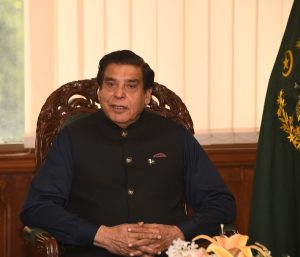Ashraf, the speaker of the National Assembly, has continued the phase-wise acceptance of the PTI’s mass resignations from the lower house in April of last year. This time, he accepted the resignations of 35 additional PTI MPs.

On Friday, Speaker of the National Assembly Raja Pervaiz Ashraf accepted the resignations of 35 additional Pakistan Tehreek-e-Insaaf legislators (PTI).
80 resignations have now been accepted, while another 43 are awaiting the Speaker’s permission.
Dr. Haider Ali Khan (NA-2), Saleem Rehman (NA-3), Sahibzada Sibghatullah (NA-5), Mehboob Shah (NA-6), Muhammad Bashir Khan (NA-7), Junaid Akbar (NA-8), Sher Akbar Khan (NA-9), and Ali Khan Jadoon (NA-16), among others, are among those who have just accepted their resignations.
NA Speaker’s “illegal move” is criticised by PTI
Asad Qaisar, a former speaker of the National Assembly and current leader of the PTI, criticised the resignations’ gradual acceptance as “illegal” and “immoral.”
In order to comply with the PTI’s demand for the acceptance of mass resignations, the former speaker asked Ashraf to take the necessary action.
Qaiser claimed that the decision of the speaker was “a farce in the name of democracy” and that it was being made “to bring a leader of opposition of their choice.”
They believe that by doing this, they will create the caretaker government of their choosing, and we will under no circumstances allow it, he said. “We oppose this entirely.”
The speaker accepted the resignations of an additional 35 MNAs earlier this week.
Imran Khan, the leader of the PTI and a former prime minister, had declared Shehbaz Sharif the current prime minister to get a vote of confidence. The most recent manoeuvre appeared to be an attempt to pressure the speaker into accepting the resignations more swiftly, but Ashraf persisted in accepting the resignations gradually to protect the prime minister.
On April 11 of last year, 123 PTI MNAs collectively resigned, two days after their party’s chairman was dismissed as prime minister following a no-confidence vote.
Qasim Suri, a former NA deputy speaker, had acknowledged their resignations.
On April 17, however, the newly elected NA Speaker Ashraf gave the assembly secretariat instructions to handle the PTI legislators’ resignations once more and bring them to him so that they could be handled legally.
Later in June, the ruling coalition developed a plan regarding the mass resignations of PTI legislators from the assembly and decided to move through with their phase-by-phase acceptance. As a result, the NA speaker accepted 11 of them.
They included some of the PTI’s top officials, including former interior minister Ijaz Ahmed Shah, former state minister for parliamentary affairs Ali Muhammad Khan, and former state minister for information and broadcasting Farrukh Habib. Shireen Mazari, a former minister of human rights, was also among them.
The NA speaker requested last month that PTI MNAs submit handwritten resignation letters to him, explaining that summoning these representatives personally was necessary to confirm that they were “willingly” resigning from their positions in the House.
According to Ashraf, the reason for calling every PTI member was to make sure they were resigning voluntarily.
He said, “When they did not appear before me the last time, I suspected that they were not willing to give their resignations.
The NA speaker was adamant that a small number of PTI MNAs had asked him not to accept their resignations, but he refused to name them.










































